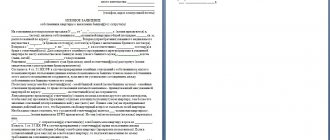Case N82-КГ17-1. On compensation for moral damage.
Laws and codes » Civil Code of the Russian Federation - part two » Section IV. Certain types of obligations » Chapter 59. Obligations due to harm » § 4. Compensation for moral damage » Article 1099. General provisions » Case N82-КГ17-1. On compensation for moral damage. SUPREME COURT OF THE RUSSIAN FEDERATION
DEFINITION
dated July 3, 2021 N 82-KG17-1
The Judicial Collegium for Civil Cases of the Supreme Court of the Russian Federation, consisting of:
presiding Pchelintseva L.M.,
judges Kirillov V.S. and Vavilycheva T.Yu.
considered in open court on July 3, 2021 a civil case based on the claim of Miller E.T. to the Ministry of Defense of the Russian Federation for compensation for moral damage
on the cassation appeal of the representative of the Ministry of Defense of the Russian Federation V.V. Petrenko against the decision of the Kurgan City Court of the Kurgan Region dated April 14, 2021 and the appeal ruling of the judicial panel for civil cases of the Kurgan Regional Court dated July 19, 2021, which partially satisfied the claims.
Having heard the report of the judge of the Supreme Court of the Russian Federation V.S. Kirillov, having listened to the explanations of the representative of the Ministry of Defense of the Russian Federation V.V. Krylov, who supported the arguments of the cassation appeal, the conclusion of the prosecutor of the General Prosecutor's Office of the Russian Federation T.A. Vlasova, who considered the appealed court decisions subject to cancellation sending the case for a new trial to the court of first instance,
Judicial Collegium for Civil Cases of the Supreme Court of the Russian Federation
installed:
Miller E.T. through representative Ermolina T.P. On January 13, 2021, he filed a lawsuit against the Ministry of Defense of the Russian Federation for compensation for moral damage in the amount of 500,000 rubles.
In support of the requirements, Miller E.T. referred to the fact that since May 23, 2011 he had been undergoing conscription military service in a military unit <...> stationed in the village of <...> region. On September 23, 2011, during physical training classes, he was seriously injured - <...>. By the decision of the hospital military medical commission of the hospital of the federal budgetary institution “354 District Military Clinical Hospital” of the Ministry of Defense of the Russian Federation dated November 14, 2011, the injury he received was qualified as military and Miller E.T. recognized as partially fit for military service - category “B”. On December 8, 2011, he was dismissed from military service under subparagraph “d” of paragraph 1 of Article 51 of the Federal Law of March 28, 1998 N 53-FZ “On Military Duty and Military Service.”
According to Miller E.T., the Ministry of Defense of the Russian Federation, as the body in which he served in military service, should be held responsible for harm caused as a result of failure to ensure the safety requirements of military service and for the guilty actions of military unit employees. Due to the fact that in connection with this injury he suffered moral and physical suffering, he asked to recover compensation for moral damage from the defendant in the amount of 500,000 rubles.
By the decision of the Kurgan City Court of the Kurgan Region dated April 14, 2021, the claims of Miller E.T. partially satisfied. From the Ministry of Defense of the Russian Federation in favor of Miller E.T. 100,000 rubles were recovered as compensation for moral damage. At the meeting the rest of the claim denied.
By the appeal ruling of the judicial panel for civil cases of the Kurgan Regional Court dated July 19, 2021, the decision of the trial court was left unchanged.
In the cassation appeal submitted to the Supreme Court of the Russian Federation by the representative of the Ministry of Defense of the Russian Federation V.V. Petrenko. The question is raised about transferring the complaint with the case for consideration at a court hearing of the Judicial Collegium for Civil Cases of the Supreme Court of the Russian Federation in order to cancel court decisions as illegal.
Based on the results of studying the arguments of the cassation appeal of the representative of the Ministry of Defense of the Russian Federation by the judge of the Supreme Court of the Russian Federation V.S. Kirillov. On January 26, 2017, the case was requested to the Supreme Court of the Russian Federation, and by its ruling dated May 26, 2021, the cassation appeal with the case was transferred for consideration at a court hearing of the Judicial Collegium for Civil Cases of the Supreme Court of the Russian Federation.
At the court hearing of the Judicial Collegium for Civil Cases of the Supreme Court of the Russian Federation, Miller E.T., representative of the military unit <...>, representatives of third parties - the Federal Treasury Department for the Kurgan Region and the FKU Military Commissariat of the Kurgan Region, duly notified of the time and place of consideration of the case in the cassation court, did not appear, and were not informed of the reasons for the non-appearance. A representative of the Federal Treasury Department for the Kurgan Region received written objections to the cassation appeal with a request to consider the case in the absence of a representative. Based on Article 385 of the Code of Civil Procedure of the Russian Federation, the Judicial Collegium for Civil Cases of the Supreme Court of the Russian Federation considers it possible to consider the case in the absence of these persons.
Having checked the case materials and discussed the arguments of the cassation appeal, the Judicial Collegium for Civil Cases of the Supreme Court of the Russian Federation finds the complaint to be satisfied, since there are grounds for canceling the court decisions in cassation.
The grounds for canceling or changing court decisions in cassation are significant violations of substantive law or procedural law that influenced the outcome of the case and without eliminating which it is impossible to restore and protect violated rights, freedoms and legitimate interests, as well as the protection of public interests protected by law ( Article 387 of the Code of Civil Procedure of the Russian Federation).
The Judicial Collegium for Civil Cases of the Supreme Court of the Russian Federation comes to the conclusion that when considering this case there are significant violations of the rules of substantive and procedural law committed by the courts of the first and appellate instances, and they are expressed in the following.
The court found that Miller E.T. from May 23 to December 8, 2011, he served as a conscript in the Armed Forces of the Russian Federation in a military unit <...> stationed in the village <...> of the Orenburg region.
On September 23, 2011, at about 5 p.m., during physical training classes, Miller E.T. fell from the horizontal bar and was injured, was taken to the hospital of the federal budgetary institution “354 District Military Clinical Hospital” of the Ministry of Defense of the Russian Federation, where he was treated until November 15, 2011.
November 14, 2011 Miller E.T. was examined by the hospital military medical commission of the federal budgetary institution “354 District Military Clinical Hospital” of the Ministry of Defense of the Russian Federation. The conclusion of the military medical commission established that Miller received E.T. severe injury during military service - <...>. Miller E.T. recognized as partially fit for military service - category “B”.
By a resolution of the senior investigator-criminologist of the military investigative department for the Totsky garrison dated October 22, 2011, to initiate a criminal case based on a report of the commission of a crime under Part 2 of Article 293 of the Criminal Code of the Russian Federation (negligence), against the captain of the military unit T., responsible for carrying out mass sports work, as well as in relation to Private Miller E.T. was denied due to the lack of corpus delicti in their actions.
December 8, 2011 Miller E.T. was dismissed from military service under subparagraph “d” of paragraph 1 of Article 51 of the Federal Law of March 28, 1998 N 53-FZ “On Military Duty and Military Service” (for health reasons - in connection with the recognition by the military medical commission as limitedly fit for military service of a soldier undergoing military service upon conscription) and was sent to the military commissariat of the Kurtamysh district of the Kurgan region.
Resolving the dispute and partially satisfying the claims of Miller E.T. for compensation for moral damage, the court of first instance, with reference to the provisions of Articles 151, 1064, 1069, 1084, 1101 of the Civil Code of the Russian Federation, proceeded from the fact that Miller E.T. moral suffering was caused as a result of improper performance by officials of the military unit <...> of their duties to monitor military personnel during the period of their physical training and take measures to prevent injuries during physical training, in connection with which I came to the conclusion that there were legal grounds for recovery of compensation for moral damage from the Ministry of Defense of the Russian Federation as the manager of federal budget funds in favor of the plaintiff.
The appellate court agreed with these conclusions of the first instance court and their legal basis. At the same time, the appellate court, citing Resolution No. 18-P of the Constitutional Court of the Russian Federation of October 20, 2010, pointed out that Article 1084 of the Civil Code of the Russian Federation allows the application of civil liability measures in cases where the fault of the authorities and state officials in causing harm to the life and health of a citizen during the performance of his military service duties has been established. Compensation for moral damage, the recovery of which was claimed by the plaintiff in connection with injury to health during military service, is one of the types of civil liability.
According to the appellate court, the absence in the actions of officials of signs of a criminal act does not exclude their civil liability in the presence of their guilty unlawful behavior, expressed in violations of laws and regulations governing the procedure for military service, in particular Federal Law dated 27 May 1998 N 76-FZ “On the status of military personnel”, the Charter of the internal service of the Armed Forces of the Russian Federation, approved by Decree of the President of the Russian Federation of November 10, 2007 N 1495 (hereinafter referred to as the Charter of the internal service of the Armed Forces of the Russian Federation).
The Judicial Collegium for Civil Cases of the Supreme Court of the Russian Federation believes that the above conclusions of the courts of first and appellate instances were made in violation of the rules of substantive law governing the disputed relations of the parties, as well as in a significant violation of the rules of procedural law.
According to Article 53 of the Constitution of the Russian Federation, everyone has the right to compensation by the state for damage caused by illegal actions (or inaction) of state authorities and officials.
In accordance with Article 59 of the Constitution of the Russian Federation, the defense of the Fatherland is the duty and responsibility of a citizen of the Russian Federation. A citizen of the Russian Federation performs military service in accordance with federal law (parts 1 and 2).
The rights, freedoms, duties and responsibilities of military personnel, as well as the fundamentals of state policy in the field of legal and social protection of military personnel, citizens of the Russian Federation discharged from military service, and members of their families are determined by Federal Law of May 27, 1998 N 76-FZ “On military status."
In accordance with paragraph 1 of Article 16 of the said Federal Law, the health protection of military personnel is ensured by the creation of favorable conditions for military service, everyday life and a system of measures to limit the dangerous factors of military service, carried out by commanders in cooperation with government authorities. Caring for the preservation and strengthening of the health of military personnel is the responsibility of commanders.
Paragraph 2 of Article 27 of the Federal Law of May 27, 1998 N 76-FZ “On the status of military personnel” provides that commanders are sole commanders and are responsible in peacetime and war for constant combat and mobilization readiness, successful completion of combat missions, combat training, education , military discipline, law and order, the moral and psychological state of subordinate personnel and the safety of military service, the condition and safety of weapons, military equipment and other military property, material, technical, financial, welfare and medical care.
Similar requirements for ensuring the safety of life and health of military personnel are enshrined in the Charter of the Internal Service of the Armed Forces of the Russian Federation, approved by Decree of the President of the Russian Federation of November 10, 2007 N 1495. Thus, in particular, in accordance with the requirements of Articles 78, 81, 101, 144 , 152, 320 of the Charter, the commander is the sole commander, in peacetime and wartime he is responsible for education, military discipline, the moral and psychological state of subordinate personnel and the safety of military service; The activities of officials of military units should be aimed at studying the mood and moral and psychological state of military personnel, implementing measures to maintain a healthy moral climate in military teams, ensuring safe conditions of service for military personnel, preventing death and injury (wounds, injuries, concussions) of military personnel .
Article 1084 of the Civil Code of the Russian Federation establishes that harm caused to the life or health of a citizen during the performance of military service, police service and other relevant duties is compensated according to the rules provided for by Chapter 59 (Articles 1064 - 1101) of this Code, unless the law provides more high level of responsibility.
In accordance with Article 1064 of the Civil Code of the Russian Federation, which defines the general grounds for liability for causing harm, harm caused to the person or property of a citizen, as well as harm caused to the property of a legal entity, is subject to compensation in full by the person who caused the harm. The person who caused the harm is released from compensation for harm if he proves that the harm was not caused through his fault. The law may provide for compensation for harm even in the absence of the fault of the harm-doer.
According to Article 1069 of the Civil Code of the Russian Federation, harm caused to a citizen or legal entity as a result of illegal actions (inaction) of state bodies, local government bodies or officials of these bodies is subject to compensation. The damage is compensated at the expense of the treasury of the Russian Federation, the treasury of a constituent entity of the Russian Federation, or the treasury of a municipal entity, respectively.
By virtue of paragraph 1 of Article 1099 of the Civil Code of the Russian Federation, the grounds and amount of compensation to a citizen for moral damage are determined by the rules provided for in Chapter 59 and Article 151 of the Civil Code of the Russian Federation.
If a citizen has suffered moral harm (physical or moral suffering) by actions that violate his personal non-property rights or encroach on intangible benefits belonging to the citizen, as well as in other cases provided for by law, the court may impose on the violator the obligation of monetary compensation for the specified harm. When determining the amount of compensation for moral damage, the court takes into account the degree of guilt of the offender and other circumstances worthy of attention. The court must also take into account the degree of physical and moral suffering associated with the individual characteristics of the citizen who suffered harm (Article 151 of the Civil Code of the Russian Federation).
Article 1101 of the Civil Code of the Russian Federation provides that the amount of compensation for moral damage is determined by the court depending on the nature of the physical and moral suffering caused to the victim, as well as the degree of guilt of the harm-doer in cases where guilt is the basis for compensation for harm.
The Constitutional Court of the Russian Federation in paragraph 3 of the resolution of October 20, 2010 N 18-P “In the case of verifying the constitutionality of a number of provisions of Article 18 of the Federal Law “On the Status of Military Personnel” and Article 1084 of the Civil Code of the Russian Federation in connection with the request of the Nogai District Court of the Republic Dagestan" noted that according to Article 1084 of the Civil Code of the Russian Federation, harm caused to the life or health of a citizen during the performance of military service, police service and other relevant duties is compensated according to the rules of Chapter 59 (Articles 1064 - 1101) of this Code, unless the law a higher level of liability is provided. In a systematic connection with Article 1064 of the Civil Code of the Russian Federation, which establishes the general grounds for liability for causing harm, and Article 1069 of the Civil Code of the Russian Federation, by virtue of which harm caused by illegal actions (inaction) of state bodies or their officials is subject to compensation at the expense of the appropriate treasury, this means that the obligation to compensate for harm caused to the life or health of military personnel and persons equivalent to them, in accordance with Chapter 59 of the Civil Code of the Russian Federation at the expense of the relevant treasury, arises if the guilt of state bodies or their officials in causing this harm is established. Consequently, Article 1084 of the Civil Code of the Russian Federation allows the use, in addition to public legal means of social protection of military personnel and members of their families, of measures of civil liability in cases where the guilt of state bodies and officials in causing harm to the life or health of a citizen in the performance of his duties military service is established.
In paragraph 1 of the resolution of the Plenum of the Supreme Court of the Russian Federation dated December 20, 1994 N 10 “Some issues of application of legislation on compensation for moral damage” (as amended by the resolution of the Plenum of the Supreme Court of the Russian Federation dated February 6, 2007 N 6) it is explained that the court should establish what confirms the fact of causing moral and physical suffering to the victim, under what circumstances and by what actions (inaction) they were caused, the degree of guilt of the inflictor, what kind of moral or physical suffering the victim suffered, in what amount he estimates their compensation, and other circumstances of significance to resolve a specific dispute. One of the mandatory conditions for liability for causing moral harm is the guilt of the causer. Exceptions are made in cases expressly provided for by law.
From the above regulatory provisions, as well as the legal position of the Constitutional Court of the Russian Federation and the explanations set out in the resolution of the Plenum of the Supreme Court of the Russian Federation, it follows that, as a general rule, the necessary conditions for imposing an obligation to compensate for moral damage are: the occurrence of harm, the wrongfulness of the behavior of the harm-doer, the presence the causal connection between the occurrence of harm and the illegality of the behavior of the harm-doer, the guilt of the harm-doer.
Consequently, the obligation to compensate for moral damage to a serviceman in connection with harm to his health (in this case, the claim is made for compensation for moral damage to the Ministry of Defense of the Russian Federation) can be assigned to state bodies or officials of these bodies if there is fault of these bodies and persons in causing harm. If it is not possible to establish the direct cause of harm, as well as his guilt, then there are no grounds for compensation for moral damage according to the rules of Chapter 59 of the Civil Code of the Russian Federation.
As for compensation for moral damage caused by the lawful actions of the harm-doer (that is, in the absence of wrongfulness of the act), it must be expressly provided for by law.
The courts of the first and appellate instances, having set out in judicial decisions the given provisions of the norms of substantive law, as well as the legal positions of the Constitutional Court of the Russian Federation contained in the resolution of October 20, 2010 N 18-P, and the explanations given in paragraph 1 of the resolution of the Plenum of the Supreme Court of the Russian Federation of December 20, 1994 N 10 “Some issues of application of legislation on compensation for moral damage”, incorrectly applied them to controversial relations.
Thus, the courts came to the conclusion that there was guilt and illegal behavior in the actions of officials of the military unit, expressed in improper execution of the instructions of the Charter of the Internal Service of the Armed Forces of the Russian Federation, approved by Decree of the President of the Russian Federation of November 10, 2007 N 1495, Manuals on physical training in the Armed Forces of the Russian Federation, approved by order of the Minister of Defense of the Russian Federation dated April 21, 2009 N 200, in the absence of proper control over military personnel during the period of physical training, failure to ensure safety in the form of failure to take measures to prevent injuries during physical training , which led to grave consequences in the form of harm to serviceman Miller E.T.
Meanwhile, this conclusion cannot be considered legitimate.
The court's decision must be legal and justified. The court bases its decision only on the evidence that was examined at the court hearing (parts 1, 2 of Article 195 of the Civil Procedure Code of the Russian Federation).
As explained in paragraph 2 of the Resolution of the Plenum of the Supreme Court of the Russian Federation dated December 19, 2003 No. 23 “On the Judicial Decision,” a decision is legal when it is made in strict compliance with the norms of procedural law and in full compliance with the norms of substantive law, which are subject to application to a given legal relationship, or is based on the application, in necessary cases, of an analogy of law or an analogy of law (part 1 of article 1, part 3 of article 11 of the Code of Civil Procedure of the Russian Federation).
When making a court decision, it is unacceptable to rely on evidence that has not been examined by the court in accordance with the norms of the Civil Procedure Code of the Russian Federation (clause 6 of the Resolution of the Plenum of the Supreme Court of the Russian Federation of December 19, 2003 No. 23 “On the Judicial Decision”).
The decision is justified when the facts relevant to the case are confirmed by evidence examined by the court, satisfying the requirements of the law on their relevance and admissibility, or by circumstances that do not require proof (Articles 55, 59 - 61, 67 of the Code of Civil Procedure of the Russian Federation), and also when it contains exhaustive conclusions of the court arising from the established facts (paragraph 3 of the said resolution of the Plenum).
Based on Part 2 of Article 56 of the Code of Civil Procedure of the Russian Federation, the court determines what circumstances are important for the case, which party must prove them, and brings the circumstances up for discussion, even if the parties did not refer to any of them.
According to Part 1 of Article 196 of the Code of Civil Procedure of the Russian Federation, when making a decision, the court evaluates the evidence, determines which circumstances relevant to the consideration of the case have been established and which circumstances have not been established, what are the legal relations of the parties, what law should be applied in this case and whether the claim is subject to satisfaction.
In addition, by virtue of the provisions of Articles 67, 71, 195 - 198 of the Code of Civil Procedure of the Russian Federation, the court is obliged to examine on the merits all factual circumstances and does not have the right to limit itself to establishing formal conditions for the application of the norm, and the court’s conclusions about facts of legal significance for the case should not be general and abstract, they must be indicated in the court order in a convincing manner with references to regulations and evidence that meet the requirements of relevance and admissibility. Otherwise, the objectives and meaning of civil proceedings established by Article 2 of the said Code are violated.
The assessment of evidence and the reflection of its results in a court decision are a manifestation of the discretionary powers of the court necessary for the administration of justice, arising from the principle of independence of the judiciary, which, however, does not imply the possibility of the court evaluating evidence arbitrarily and in contradiction with the law.
In violation of the above norms of procedural law and the explanations given in the resolution of the Plenum of the Supreme Court of the Russian Federation, the courts, pointing out the guilt and unlawful behavior of officials of the military unit, which caused the serviceman Miller to receive E.T. injuries, did not identify and establish legally significant circumstances for the case, namely: what is the guilt and illegality of the behavior of officials of the military unit, what evidence confirms this.
The circumstances of the case established by the court, the evidence on which the court's conclusions about these circumstances are based, the arguments on which the court rejects certain evidence, the laws that guided the court, must be indicated in the reasoning part of the court decision (Part 4 of Article 198 of the Civil Procedure Code Russian Federation).
There is no evidence in the case materials and in the decisions of the court of first and appellate instances indicating that the harm to the health of Miller E.T. caused as a result of guilty illegal actions of officials of a military unit, which, due to the above legal regulation, is a prerequisite for imposing the obligation to compensate for moral damage on state bodies or officials of these bodies according to the rules of Chapter 59 of the Civil Code of the Russian Federation.
Consequently, the courts of first and appellate instances, in violation of the requirements of Articles 195, 196 and 198 of the Civil Procedure Code of the Russian Federation, resolved the dispute in the absence of adequate evidence confirming the commission of illegal actions by officials of the military unit and their guilt in directly causing harm to the life and health of serviceman Miller E. T.
At the same time, the courts did not evaluate the decision to refuse to initiate a criminal case dated October 22, 2011, to which the defendant referred. This resolution established that Private Miller E.T. independently performed an exercise on the crossbar (horizontal bar), which is not included in the list of exercises performed by military personnel in accordance with the Manual on Physical Training in the Armed Forces of the Russian Federation, approved by Order of the Minister of Defense of the Russian Federation dated April 21, 2009 N 200, and as a result of his violation of the provisions Article 161 of the Charter of the Internal Service of the Armed Forces of the Russian Federation, without ensuring the safety of his health, he fell from it. Captain Trushin D.V., responsible for carrying out sports and mass work, under whose subordination was the company where Miller E.T. served, fulfilled his official responsibilities for the safety of military service and the prevention of death and injury to military personnel in full.
In addition, when determining the amount of compensation for moral damage, the courts also did not take into account the explanations contained in paragraph two of paragraph 8 of the resolution of the Plenum of the Supreme Court of the Russian Federation of December 20, 1994 No. 10 “Some issues of application of legislation on compensation for moral damage”, that that the degree of moral or physical suffering is assessed by the court taking into account the actual circumstances of the infliction of moral harm, the individual characteristics of the victim and other specific circumstances indicating the severity of the suffering he suffered.
When determining the amount of compensation for moral damage, the court, taking into account the requirements of reasonableness and fairness, should proceed from the degree of moral or physical suffering associated with the individual characteristics of the person who suffered harm, the degree of guilt of the offender and other noteworthy circumstances of each case (paragraph 32 of the resolution of the Plenum of the Supreme Court of the Russian Federation Federation of January 26, 2010 No. 1 “On the application by courts of civil legislation regulating relations under obligations resulting from harm to the life or health of a citizen”).
The court, in violation of the above rules of procedural law and clarifications of the Plenum of the Supreme Court of the Russian Federation, considered the claims of Miller E.T. for compensation for moral damage in his absence, without directly receiving from the plaintiff the necessary explanations on legally significant circumstances, without examining and assessing the circumstances relating to the degree of physical and moral suffering of the plaintiff.
In violation of the requirements for a court decision (part 1 of Article 195 of the Code of Civil Procedure of the Russian Federation) and the explanations of the resolution of the Plenum of the Supreme Court of the Russian Federation of December 19, 2003 No. 23 “On the court decision” on the application of this procedural norm, the courts of the first and appellate instances did not provide in court decisions no arguments were given to substantiate the amount of compensation awarded to the plaintiff for moral damages and they did not refer to any evidence.
In view of the above, the conclusions of the courts of first and appellate instances on the satisfaction of the claims of Miller E.T. claims for compensation for moral damage cannot be recognized as based on the law.
The Judicial Panel also considers it necessary to pay attention to the following.
Part 3 of Article 45 of the Code of Civil Procedure of the Russian Federation establishes that the prosecutor enters into the process and gives an opinion in cases of eviction, reinstatement at work, compensation for harm caused to life or health, as well as in other cases provided for by the Code and other federal laws, in order exercise of powers vested in him.
In paragraph 3 of the resolution of the Plenum of the Supreme Court of the Russian Federation dated January 26, 2010 No. 1 “On the application by courts of civil legislation regulating relations under obligations resulting from harm to the life or health of a citizen”, it is explained that in accordance with Part 3 of Article 45 of the Code of Civil Procedure of the Russian Federation, the prosecutor has the right participate in the consideration of cases of compensation for harm caused to the life or health of a citizen, including cases of compensation for moral damage caused by damage to the health or death of the breadwinner.
In violation of the provisions of Part 3 of Article 45 of the Code of Civil Procedure of the Russian Federation, as well as the explanations set out in paragraph 3 of the resolution of the Plenum of the Supreme Court of the Russian Federation dated January 26, 2010 No. 1, the court of first instance considered the dispute that arose regarding compensation for moral damage caused by damage to the health of a citizen, without participation in the case of the prosecutor and giving him an opinion.
Taking this into account, the appealed court decisions cannot be considered legal, since they were adopted with significant violations of the norms of substantive and procedural law that influenced the outcome of the case, without their elimination it is impossible to restore and protect the violated rights and legitimate interests of the applicant, which, according to Article 387 of the Code of Civil Procedure of the Russian Federation, is the basis for cancellation of the appealed court decisions with the referral of the case for a new trial to the court of first instance.
When reconsidering the case, the court should take into account the above and resolve the dispute in accordance with the established circumstances and requirements of the law.
The Judicial Collegium for Civil Cases of the Supreme Court of the Russian Federation, guided by Articles 387, 388, 390 of the Civil Procedure Code of the Russian Federation,
determined:
the decision of the Kurgan City Court of the Kurgan Region dated April 14, 2021 and the appeal ruling of the judicial panel for civil cases of the Kurgan Regional Court dated July 19, 2021 are cancelled, the case is sent for a new trial to the court of first instance - the Kurgan City Court of the Kurgan Region.







